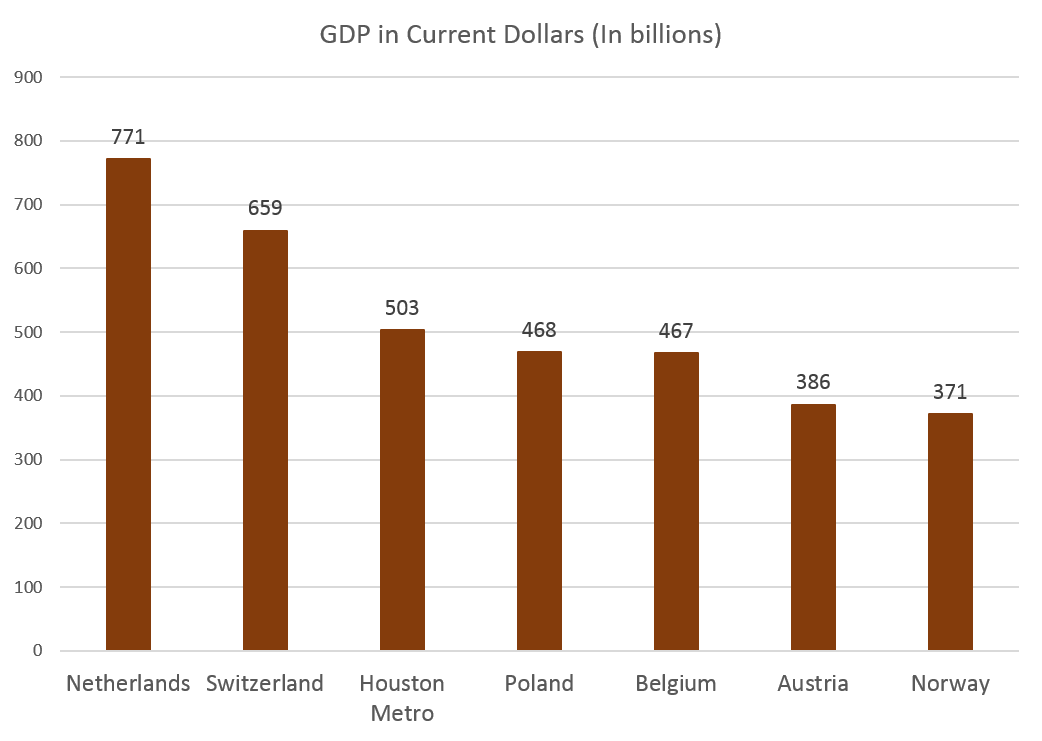In his article today, Christopher Westley noted that Texas’s economy — when measured by GDP — is larger than Canada’s. In other words: If Texas were an independent country, it would be the world’s 10th largest economy (totaling $1.6 trillion), and its citizens would be more than capable of addressing natural disasters of the magnitude of a major flood. Texas’s economy is also larger than those of Russia and Australia.
By why stop our analysis at the state of Texas? Indeed, if we look at the GDP of the Houston metropolitan area, we find it comes in at $503 billion. This total is similar to the GDPs of Poland, Belgium, and Austria. It’s significantly larger than the GDPs of Norway and Denmark.1



Nor is Texas’s GDP largely driven by federal spending — so we can’t say that Texas’s economy depends on federal spending to stay afloat. When we look at federal spending in Texas compared to the federal taxes paid by Texans, we find it’s nearly a one-for-one relationship. So, if the Federal government stopped spending in Texas — but allowed Texans to keep their money, Texas would be fine.

Indeed, as Westley notes, the Houston area has benefitted from its relatively laissez-faire politicies in recent decades, and this will enable the region to more easily confront its troubles: “What makes Houston different has to do with property rights institutions taking root and developing there over decades, making it a center for capital investment, because capital always flows to those areas where it is most secure.”
Nevertheless, because there’s money there for the taking, the Texas state government and countless local governments in Texas will be more than happy to take the federal aid that Donald Trump was recently promising as he posed for photo ops near the flood zone. After all, if taxpayers from the other 49 states are being forced to hand over money to Texans, why refuse “free” money?
This free cash promised for Texas has already lit up the usual leftwing outlets with charges of hypocrisy and foolishness on the part of GOP politicians who have in the past allegedly been stingy with federal disaster-relief funds. One New Orleans columnist opines that “Texas Republicans will have some explaining to do“ since nearly the entire GOP Texas delegation in Congress “ voted against a $50.5 billion relief package for victims after 2012 superstorm Sandy slammed into New York and other parts of the Northeast.”
Now that Texas “needs” Federal funds, the shoe is on the other foot! Or so we’re told.
It’s true enough that GOP Texas politicians have themselves in a political bind here. If they refuse the funds, local voters who think the federal funds are essentially without cost to them will largely be angry their Congressmen and Senators didn’t grab the cash.
But, of course, the politicians themselves — and the voters who supported their reluctance to shell out more federal spending on disaster funds — will look like hypocrites.
Now, in a properly-functioning confederation of states, the Texas delegation could simply say this: “Hey Congress and Trump, we don’t actually need your money. Instead of giving us money from the taxpayers in other states, how about you just give us back a big chunk of all the federal taxes you drained from our economy this year? Thanks in advance.”
Unfortunately, direct federal taxation of Texans makes this a logistical impossibility, so all the tax funds must be trafficked through Washington, the bureaucrats will take their cut, and then some dollars will filter back to Texas in the form of disaster-relief funds.
It likely that many Texas taxpayers see the situation as a matter of getting back funds already paid. They’re thinking “I pay federal taxes constantly, so I might as well get some of it back to rebuild the infrastructure the floods washed away. With my taxes, I already paid to rebuild New Orleans and the Hurricane Sandy victims, anyway.”
There is a certain soundness to this logic, in spite of its lack of precision. In any case, the whole situation reminds us it would be best to simply do away with all the constant robbing of Peter in State X to pay Paul in State Y.
Of course, we’ll be told that federal disaster relief programs are all about “sharing” and “cooperation” and “kindness.” In reality, it’s all just about forcing one group of people to hand over money to another group of people. There is no doubt that Texas and Houston now face significant challenges in rebuilding after the flood. But, when we demand that other regions and states pay for the rebuilding of Texas, we’re acting as if those other states and communities don’t have problems of their own. Needs related to poverty, infrastructure, and education in, say, Michigan did not magically disappear because Texas experienced a flood. The only reason it now seems right to take money from people in Michigan, and hand it over to Houstonians, is because Houston’s problems are in the headlines, and Michigans mundane daily problems are not. The central planners have decided that Houstonians deserve Michigan’s money. But the rationale for this decision is purely political, and thus arbitrary.
This isn’t to say real sharing and kindness are a bad thing. It’s excellent that private charities have already been hard at work helping with the cleanup in Houston. If one wants to insist that governments be involved, there’s nothing stopping other states from handing over funds to Texas directly. The federal government need not be involved at all.
- 1Source for metro area GDP comes from the Bureau of Economic Analysis. National GDP totals and state GDP comparisons can be found here and here and here. In most cases, the data is from 2015 and 2016.


